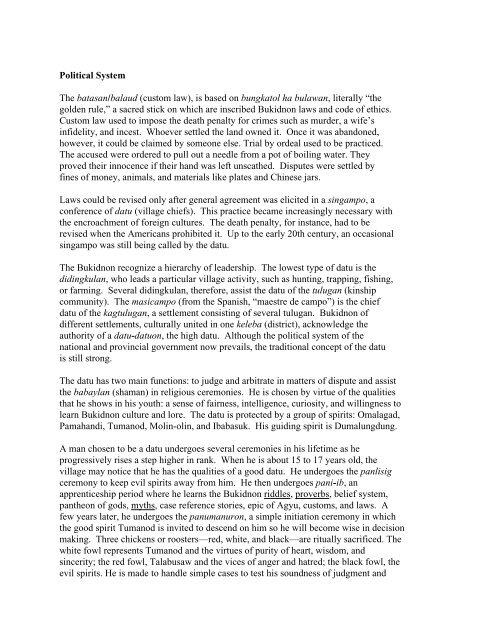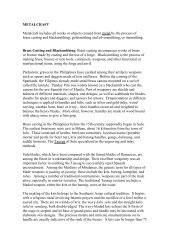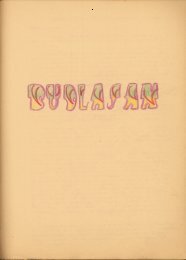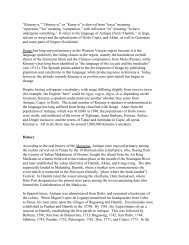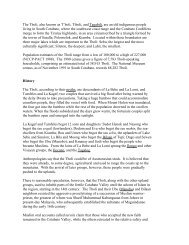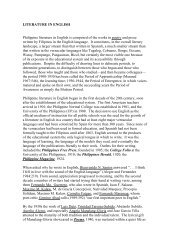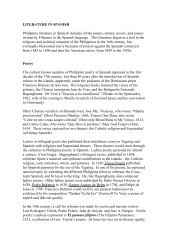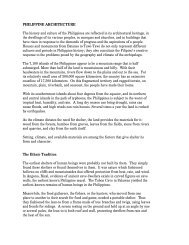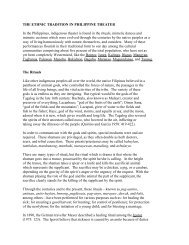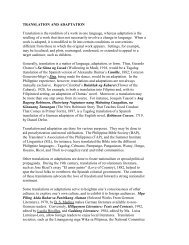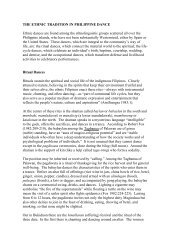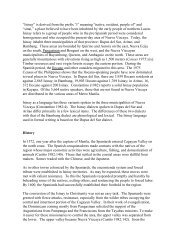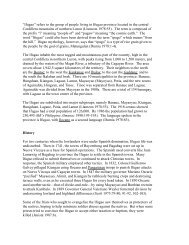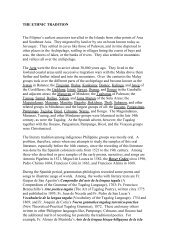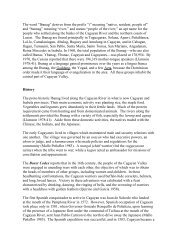You also want an ePaper? Increase the reach of your titles
YUMPU automatically turns print PDFs into web optimized ePapers that Google loves.
Political System<br />
The batasan/balaud (custom law), is based on bungkatol ha bulawan, literally “the<br />
golden rule,” a sacred stick on which are inscribed <strong>Bukidnon</strong> laws and code of ethics.<br />
Custom law used to impose the death penalty for crimes such as murder, a wife’s<br />
infidelity, and incest. Whoever settled the land owned it. Once it was abandoned,<br />
however, it could be claimed by someone else. Trial by ordeal used to be practiced.<br />
The accused were ordered to pull out a needle from a pot of boiling water. They<br />
proved their innocence if their hand was left unscathed. Disputes were settled by<br />
fines of money, animals, and materials like plates and Chinese jars.<br />
Laws could be revised only after general agreement was elicited in a singampo, a<br />
conference of datu (village chiefs). This practice became increasingly necessary with<br />
the encroachment of foreign cultures. The death penalty, for instance, had to be<br />
revised when the Americans prohibited it. Up to the early 20th century, an occasional<br />
singampo was still being called by the datu.<br />
The <strong>Bukidnon</strong> recognize a hierarchy of leadership. The lowest type of datu is the<br />
didingkulan, who leads a particular village activity, such as hunting, trapping, fishing,<br />
or farming. Several didingkulan, therefore, assist the datu of the tulugan (kinship<br />
community). The masicampo (from the Spanish, “maestre de campo”) is the chief<br />
datu of the kagtulugan, a settlement consisting of several tulugan. <strong>Bukidnon</strong> of<br />
different settlements, culturally united in one keleba (district), acknowledge the<br />
authority of a datu-datuon, the high datu. Although the political system of the<br />
national and provincial government now prevails, the traditional concept of the datu<br />
is still strong.<br />
The datu has two main functions: to judge and arbitrate in matters of dispute and assist<br />
the babaylan (shaman) in religious ceremonies. He is chosen by virtue of the qualities<br />
that he shows in his youth: a sense of fairness, intelligence, curiosity, and willingness to<br />
learn <strong>Bukidnon</strong> culture and lore. The datu is protected by a group of spirits: Omalagad,<br />
Pamahandi, Tumanod, Molin-olin, and Ibabasuk. His guiding spirit is Dumalungdung.<br />
A man chosen to be a datu undergoes several ceremonies in his lifetime as he<br />
progressively rises a step higher in rank. When he is about 15 to 17 years old, the<br />
village may notice that he has the qualities of a good datu. He undergoes the panlisig<br />
ceremony to keep evil spirits away from him. He then undergoes pani-ib, an<br />
apprenticeship period where he learns the <strong>Bukidnon</strong> riddles, proverbs, belief system,<br />
pantheon of gods, myths, case reference stories, epic of Agyu, customs, and laws. A<br />
few years later, he undergoes the panumanuron, a simple initiation ceremony in which<br />
the good spirit Tumanod is invited to descend on him so he will become wise in decision<br />
making. Three chickens or roosters—red, white, and black—are ritually sacrificed. The<br />
white fowl represents Tumanod and the virtues of purity of heart, wisdom, and<br />
sincerity; the red fowl, Talabusaw and the vices of anger and hatred; the black fowl, the<br />
evil spirits. He is made to handle simple cases to test his soundness of judgment and


